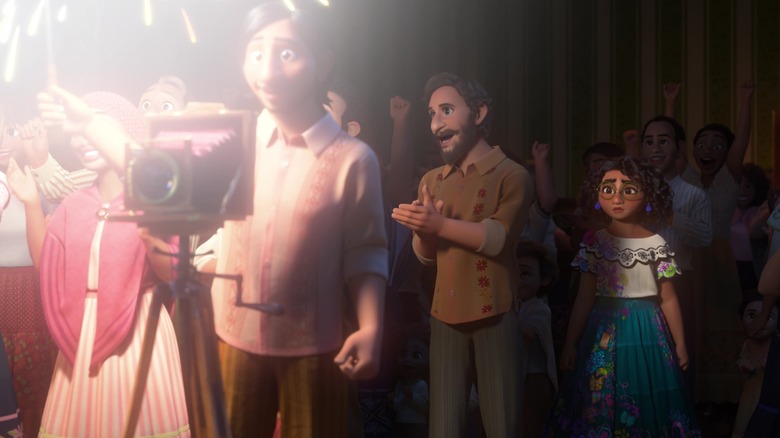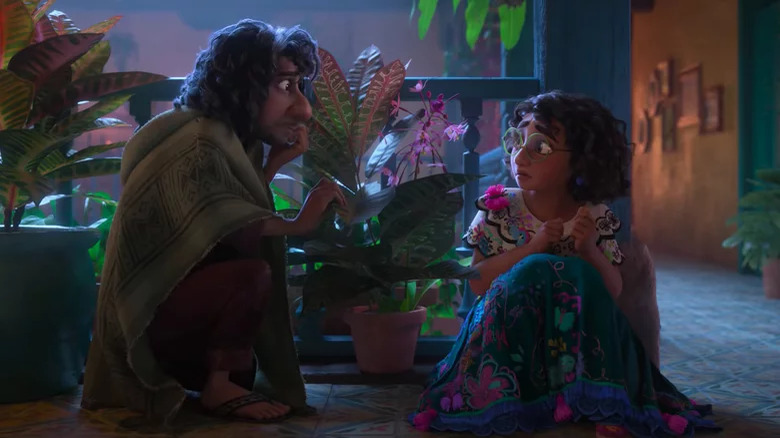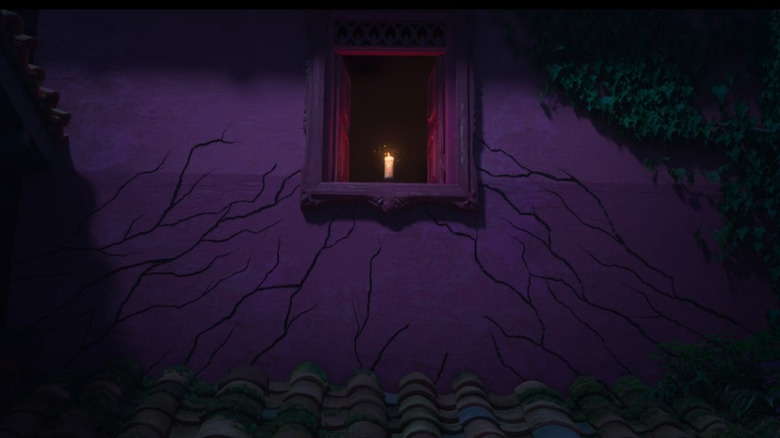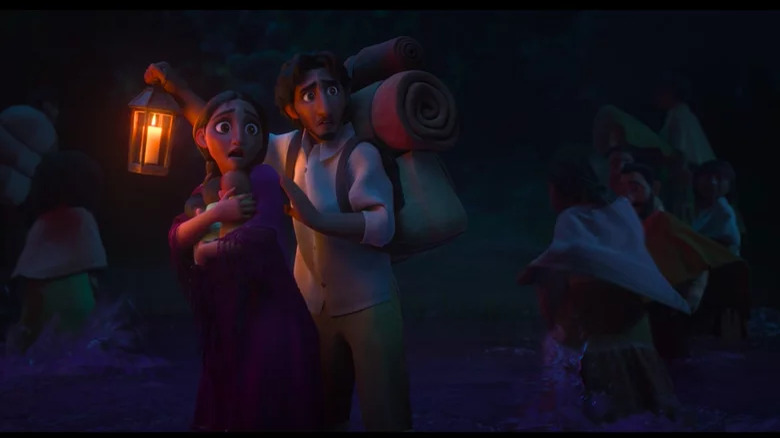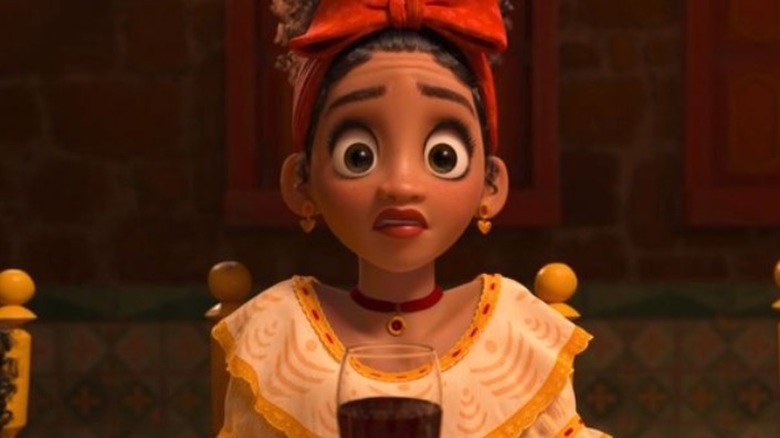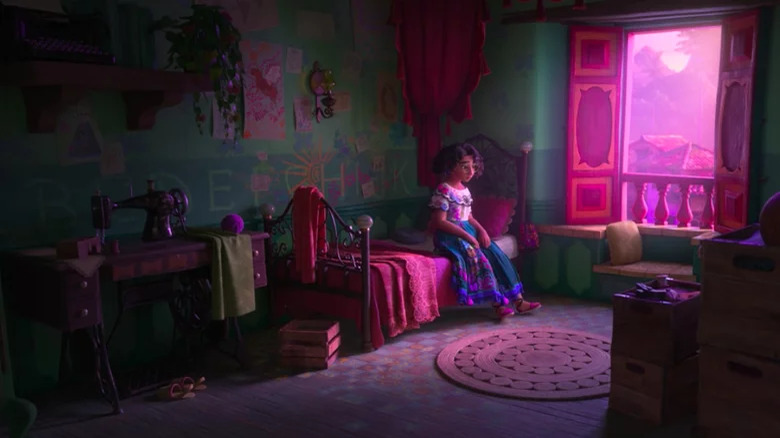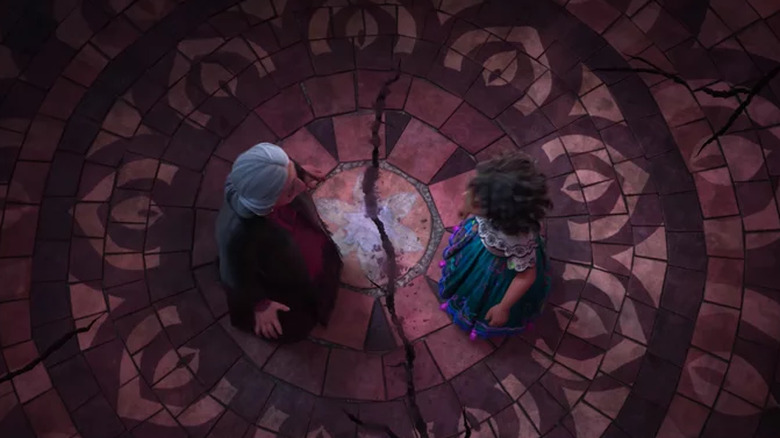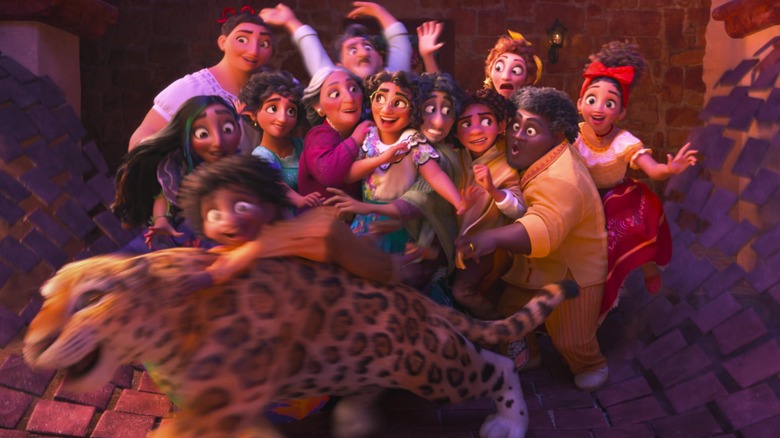The Biggest Unanswered Questions In Encanto
Disney's "Encanto" is deliberately confusing, and that's part of why it's so great. It makes a point of only vaguely explaining its various magical happenings, allowing viewers to draw their own conclusions. As it centers around a large extended family, it also has a lot of characters to keep straight, most of whom boast their own unique and spectacular powers. Even if it wanted to, "Encanto" simply doesn't have the time to explain every little detail of its plot.
This complex and ambiguous nature hasn't kept "Encanto" from becoming a smash hit. But once they've finally managed to see what all the fuss is about, many viewers might find themselves a bit confused. A much less straightforward film than predecessors like "Frozen" or "Tangled," "Encanto" uses magic as a metaphor for the bond that keeps families together, and plays fast and loose with rules that it doesn't even slow down to explain. Feeling a bit lost? You're not alone. These are the biggest unanswered questions in "Encanto."
When does Encanto take place?
It's very unclear when "Encanto" takes place. Small items of technology, including an old-fashioned camera and a sewing machine, might place it around the beginning of the 20th century. Certain items of clothing like button-down shirts also appear, which indicate the story does not take place in the distant past. But Mirabel's thin-framed eyeglasses look distinctly modern, especially when compared to other characters' garments and accessories. And then there's Alma and Pedro's story, which muddies the temporal waters even more thoroughly. "Encanto" depicts Alma and Pedro being forced to flee their home decades before the events of the movie, due to an armed conflict that isn't explained or specified. Newsweek speculates that this might be the Thousand Days' War, which raged from 1899 to 1902, but this is far from conclusive.
A specific time period isn't necessary for "Encanto" to tell a successful story, of course. Moreover, refusing to anchor it in history isn't an oversight: It's a meaningful creative choice. Leaving things vague puts more emphasis on the magical elements of the story, which in turn highlights the familial bond that is the movie's core. It doesn't really matter which conflict causes Alma to lose her husband and her home — the conflict itself, and the miracle it spawns, are the keystones of the story. But of course, this won't stop curious fans from wondering when exactly these events take place.
What threatens the miracle, exactly?
The opening scenes of "Encanto" establish quite a bit of information. While fleeing an armed conflict with her infant triplets, Alma Madrigal witnesses her husband's death. A miracle happens in the wake of this tragedy: The candle she's carrying gains a mystical design, and proceeds to build a sentient house (the Casita) for her to live in, within a lush valley protected by mountains. As the years go by, each of Alma's children and grandchildren receive a magical power of some kind. However, 10 years prior to the events of the story, granddaughter Mirabel mysteriously doesn't receive a gift. This ominously indicates a grave threat to the candle, and the miracle at large.
But what exactly is this threat? Mirabel spends the entire movie trying to figure out its mysterious nature, but only finds a cryptic vision from her uncle Bruno of herself in front of a badly damaged Casita. Alma and the rest of the family inexplicably assume the threat is somehow coming from Mirabel, when in reality, she's just trying to figure it out. As we end up seeing, there's a deeper emotional significance to this looming danger that echoes through the generations. But at no point does anyone actually figure out or explain what, precisely, is menacing the candle, and why. Things are kept especially opaque by the fact that the family spends the majority of the movie refusing to even discuss the threat.
Can Bruno only see bad visions?
With the exception of Mirabel (for unknown reasons), every child in the Madrigal family receives a magical power at the age of 5. For the most part, they're granted very useful powers like super-strength, super-hearing, and the ability to control the weather through their emotions. But Mirabel's uncle Bruno receives the "gift" of precognitive visions that always seem to be bad news. "We Don't Talk About Bruno" reveals that Bruno has told various townspeople their pet goldfish would die, they'd go bald, and they'd develop a protruding gut — all of which came to pass. What use is this miserable gift, if all Bruno can do is tell people about bad things that cannot be prevented? Can he truly not see anything positive coming down the pike?
Sometimes, Bruno's gift actually seems to manifest his visions: When Bruno tells his sister Pepa that it "looks like rain" on her wedding day, Pepa becomes miserable, which brings about rain. It's no wonder, then, that when Bruno has a troubling vision of Mirabel and the Casita cracking apart, he hides from the family for the next decade in an effort to protect them. One of the chief sources of tension in "Encanto" is Mirabel's disappointment over never receiving a gift of her own, but her uncle's example should be a consolation: Gifts can be so brutal, they're better defined as curses.
What do the other rooms look like?
The Madrigals' Casita is an extremely cool domicile — who wouldn't enjoy magical stairs that can transform into a party-ready slide? Its coolest aspect by far, however, is that each child who receives a gift also gets access to a unique, magical room of their own. Each of these fantabulous rooms is much bigger on the inside than it appears, dwarfing even the Casita's apparent size. They also reflect the resident's nature, and that of the supernatural gifts they receive. Unfortunately, we only get to see three of these rooms over the course of "Encanto": Antonio's jungle-inspired animal kingdom, Bruno's portentous and mystical tower, and Isabela's rose-filled wonderland.
It's impossible not to wonder what the other rooms look like. Indeed, passing them over seems like a missed opportunity for "Encanto" to unleash its animators on the field of endless possibility the other Madrigals' gifts imply. What sort of weather takes place in Pepa's room? Does Luisa's room have massive things to help her hone her strength? We can only guess what Camilo the shapeshifter's room might look like — perhaps a hall of mirrors? Is Julieta's room the greatest kitchen the world has ever seen? We can only speculate, unfortunately — and remain jealous of Antonio's sweet treehouse.
Why do the cracks in the Casita initially disappear?
"Encanto" has solid reasons for keeping viewers in the dark as to how the Madrigals' magic functions. But this also makes it all the more frustrating when the family refuses to discuss the nature of their gifts and house with each other. This secrecy is eventually explained to spring from Alma's fear and trauma, which has been passed down to her children and grandchildren in complex ways. But this doesn't make it any less frustrating to watch her pretend not to believe Mirabel about seeing cracks appear in the Casita during Antonio's gift celebration.
It stands to reason that the only child who didn't receive a gift of her own would be extra sensitive to a problem with the Casita, yet everyone dismisses Mirabel as if she's lying to spoil her cousin's special night. Moreover, why do the cracks that she sees disappear in the first place? Is the Casita conspiring, like Alma, to make it seem like nothing is wrong? Can it repair itself, or does it simply move the cracks somewhere else? This latter explanation might be supported by the cracks in the inner walls Bruno has been repairing while in hiding. "Encanto" mines a lot of drama from the sight of the Casita being consumed by these mysterious cracks, but their inconsistency and the confusing nature of the Casita itself makes it hard to know how much of a threat the Madrigals truly face.
How does Mirabel get down from Bruno's tower?
Though the audience doesn't know what Mirabel will find at the end of her quest once she sets out for Bruno's tower, they're on the edge of their seats as she makes her way to that forbidden doorway. She has a literally long way to go to reclaim his lost vision: His sanctum is at the top of a seemingly endless, dramatically winding staircase. And that's not all — of all the Madrigal bedrooms seen in the film, Bruno's is by far the most fantastical, perilous and reality-defying. Sand blows everywhere. Enormous cliffs loom on either side of the terrifying stairs. Once Mirabel finally gets to the top, so exhausted she's on her hands and knees, she finds herself confronted by a gaping chasm she must swing across on a rope.
After finding the vision in the cave beyond the chasm, Mirabel is forced to flee a deluge of sand. Once she makes her way back to the chasm, however, the rope is clearly no longer on her side of the gap. How does she get down? "Encanto" cuts from this moment straight to Mirabel leaving Bruno's room entirely, via the door. After making such a point of the Casita not being able to help her in this room, then spending so much time on her physical climb to the top, it feels like cheating for the movie to skip her way back down, especially given the absent rope.
Why does the miracle wait until Abuelo Pedro dies?
In the world of "Encanto," magic exists, and can manifest itself as spontaneous miracles. The most dazzling example of this arrives right after Alma Madrigal watches Pedro, her husband, die. As she loses herself in a grief-ridden sob, a miracle occurs: The candle she carries becomes emblazoned with a luminous symbol, and generates a sparkling wave of magic that blasts her husband's murderers away, pulls up the mountains to shelter her, and builds her a new home. The miracle goes on to set her and her family up for generations, making them the de facto leaders of their small village.
Too bad Pedro misses the miracle by mere seconds. Why couldn't it have happened a little bit earlier, if it's capable of such tremendous feats? Viewers can easily interpret that the miracle happens as a result of Pedro's sacrifice, or out of Alma's grief and shock at losing him. But that theme isn't really explored in "Encanto" — instead, the story focuses on Alma's desire to hold onto the miracle because of what she had to go through to receive it. That's a valid angle for the film to take, but this moment also sets up its entire reality. Without knowing more, it's hard not to view the miracle as capricious, or even driven entirely by what the plot needs. It couldn't happen before Pedro dies, because then, Alma wouldn't be haunted by anything, and "Encanto" would have no conflict.
Why doesn't Dolores say anything about Bruno?
Dolores' gift of super-hearing is an enormously fun element of "Encanto." It also begets an endless number of unanswered questions, all by itself. Dolores can hear someone whispering from miles away, which means she should, in theory, be aware of pretty much everything that happens in "Encanto." Does she not hear the cracks appear in the Casita the first time? Is she asleep when Abuela is talking to herself about the threat that looms over the miracle? Does she somehow ignore Mirabel questioning Luisa about her lapse in power?
Out of all these questions, one emerges as particularly glaring: Why doesn't Dolores say anything about Bruno for 10 years? It seems distinctly possible she's aware that Bruno has not, in fact, run away, and is hiding in the walls — "It's like I can hear him now," she sings, during "We Don't Talk About Bruno." Obviously, the whole family is troubled by Bruno's dark visions: They sing an entire song about why they don't even talk about him in passing. But Dolores has had a decade to spare the rest of her family a lot of emotional pain over Bruno's disappearance. It's possible that, if she'd ever said anything, the family could have spoken to Bruno about his vision of Mirabel and sorted out the threat to the miracle years before the events of the movie.
Why doesn't Mirabel get a gift and a room?
After the Casita crumbles, the candle goes out, and everyone's gifts disappear. The Madrigal family proceeds to reconcile on even ground. Alma apologizes for holding onto the miracle too tightly out of fear, the townsfolk help the family rebuild the Casita as it once was, and a new day dawns. Now that everyone's been forced to confront their weaknesses and flaws, there's no longer an imbalance between Mirabel and the rest of her family. Bruno even calls her, very touchingly, the "real gift." It seems, for a moment, as though everyone's powers are truly gone, and that this might be okay.
When Mirabel puts the finishing touch on the Casita with a new doorknob, though, "Encanto" restores everything to the magical status quo. The Casita is sentient again, and all of the Madrigals get their powers back. But as far as we can tell, Mirabel still doesn't get a gift, or a room of her own. Why bring the magic back at all if not to address the mystery of what her power is? And if she's really destined for a permanent lack of gift, why can't her loving house do her a solid and move her out of the nursery, at the very least? The movie ends too abruptly to be sure either way whether Mirabel gets a gift or doesn't, which feels criminal after it acts as a source of tension for so long.
Does Mirabel cause the cracks, or does Alma?
The chief conflict in "Encanto" is the clash between Mirabel's desire to understand what's happening to the miracle and Alma's desperation to ignore the issue entirely, out of devastating anxiety. Alma refuses to even question the viability of the miracle that saved her and her loved ones, which causes, ironically, a rift between her and those she holds dear: One of her sons runs away for 10 years, Mirabel grows up feeling like an outcast, and everyone else feels terrified to ever express dissatisfaction or doubt.
The cracks in the Casita initially only appear to Mirabel. She goes on to cause plenty of destruction in Bruno's tower and the house at large, just by investigating. Eventually, the Casita falls apart entirely, and the candle goes out as Alma and Mirabel have a shouting match. After a tender discussion, Alma admits her guilt: She has refused to see the damage her rigidity inflicts upon her family, and that drove them to ruin. But we never really learn if this core trauma is what caused the cracks, or if it truly was Mirabel's curiosity. We just have to accept that Alma knows it was her fault — we don't understand, at any point, exactly how her emotional state causes issues with the miracle. Is it all down to her? Do the cracks reflect the overall family mood? It's left unclear.
Should the Madrigals just go to therapy?
Once you reach the end of "Encanto," you have to wonder what the future holds for the Madrigal family. Despite living in harmony in the mountains for decades, enjoying their many magical gifts, they have severe communication problems that literally destroy their home. Isabela nearly marries someone she doesn't love just to please the family, Luisa is about to crack under the pressure of being the "strong" one (literally and figuratively), and no one even talks about Bruno's long absence. For all the joy in the Casita, there's a lot of silence, too.
A good family therapist could have solved these problems long ago, and you end up hoping the Madrigals will talk to someone like that in the future. For all that's changed by the end of "Encanto," outside of a few cathartic musical numbers, no one has really talked about their issues all that much. Moreover, with all of their magical abilities returning, it's easy to imagine they'll forget they're more than just their gifts in the future. Alma in particular is dealing with decades of stress that could easily manifest as another magical crisis. Hopefully, getting her family to talk about their feelings is Mirabel's gift after all — she'll probably need it in the future.

